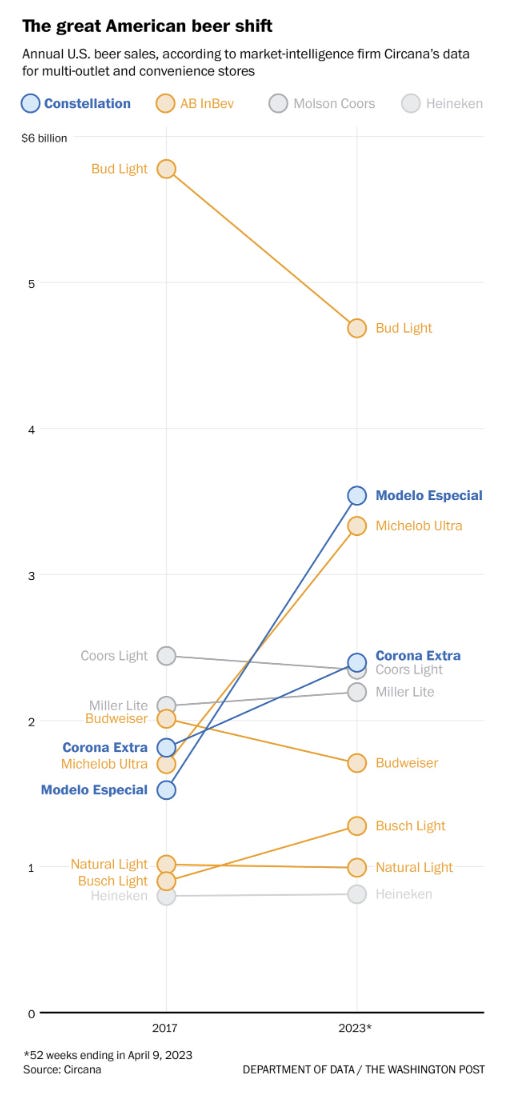Apologies for the dead link to the Shanghai picture in the last issue. I can update mistakes on the site, not email, so if you missed it here you go.
Happy reading!
-TK
📎🗓 A well-written essay looking at contemporary attitudes towards work through a historical lens, placing “quiet quitting” in the broader context of an “entrepreneurial work ethic” that appeared in the early 20th century. Worth reading in full. (Harper’s | Erik Baker | May 2023)
Baker’s argument is that for much longer than we think, our attitudes about work have been framed by an “entrepreneurial work ethic” that promises personal actualization through labor. Our current crisis of work and meaning is not a rejection of tradition but an embrace of its promises:
Our culture has scripts about what makes work worthwhile, not just necessary; not a burden to be endured but an important component of a flourishing life. And increasingly these scripts do not play out as written…
But entrepreneurialism proved resilient, in large part because of its uncanny ability to redeploy the critical impulse for its own ends. Complaints about meaningless work often damn the present state of things in the name of an ideal ultimately derived from the entrepreneurial ethic itself. They concede that it is proper to seek meaning or personal fulfillment or self-development at work… The countercultural refuseniks of today become the non-profit bosses and tech gurus of tomorrow. Will it be any different this time?
On how the pandemic was a destabilizing inflection point:
It forced a wide swath of the workforce to confront, in a particularly visceral fashion, the fact that their work was “non-essential.” Whatever technical definitions governments and employers gave to this category, its sting was hard to escape. “ ‘Nonessential’ is a word that invites creeping nihilism”… It was a moment of cutting one another an unprecedented degree of slack. And the world didn’t fall apart.
On the need for a positive articulation of the good life, something liberal politics is by nature uncomfortable with. (Especially interesting to me, post-work ethics was the subject of my abandoned thesis):
a world divided between a small group of Muskian oligarchs and a vast surplus population living idle lives… I think this specter should lead the post-work left to devote more attention to the task of developing a positive vision of what human flourishing might look like in the absence of work… it’s hard to explain what makes for a bad life without a competing conception of a good one—and drawing such a contrast seems indispensable if one is to distinguish the socialist vision of life after work from the libertarian one.
So where to from here? I thought this part was helpful to connect to Marc Andreessen’s 2020 “It’s Time to Build” and the conversation that spurred.
The question is whether working Americans will, once again, respond to their disillusionment by rallying behind some new dream of meaningful work…
Across the political spectrum, one now finds a variety of schemes for reorienting the economy around meaningful work. This aspiration is one valence of Make America Great Again, and the Trumpist movement’s rhetorical gestures toward the power of protectionism and immigration restriction to transform the United States into a country that makes things once more. But it’s also the animus of the “supply-side progressivism” championed by Ezra Klein and Derek Thompson, among others. Klein and Thompson point out that there is, in fact, plenty of useful stuff, such as green energy and housing, that we could be making. They understand this misallocation of productive resources as a market failure that government intervention, in the form of a new industrial policy, could rectify…
Or will we finally divorce meaning from work altogether?
Americans’ increasing familiarity with work that is neither gratifying nor unendurable underpins what might turn out to be the most likely short-term resolution of the current legitimation crisis: the rejection of the entrepreneurial work ethic in favor of a more cold-blooded understanding of work as a simple exchange of drudgery for money…
If managers, influenced by the doctrines of the entrepreneurial work ethic, didn’t encourage their subordinates to seek fulfillment at work, their employees would, ironically, be less dissatisfied.
🍿🎬👵 One of my favorite media writers, Matt Belloni, covers a new survey on the Top 100 stars with the most theatrical box office pull. Bottom line: they’re “old, and getting older.” (Puck | Matt Belloni | Apr 2023)
Tom Cruise
Dwayne “The Rock” Johnson
Tom Hanks
Brad Pitt
Denzel Washington
Only one out of the top 20 was under 40 (Chris Hemsworth, 39, at No. 20,) and only 4% of the Top 100 were under 30.
This largely tracks with the common narrative that true movie stars are a dying breed, and when we look up from our phones it’s the CGI superhero suit we see more than the increasingly interchangeable Hollywood face. Even so, I was surprised to see Timothée Chalamet, 27, so far down at No. 94. Meanwhile, Adam Sandler, 56, was No. 5 with Gen Z audiences. 🤷♂️
👩⚕️🎙 On the trend of ”therapy speak” creeping out of HR departments and therapists’ offices into everyday conversations with friends and family (Bustle | Rebecca Fishbein | Apr 2023)
the emphasis on protecting one’s individual needs can overlook the fact that someone else is on the other side of that boundary-setting. In 2019, for instance, a relationship coach’s Twitter thread offering a template for telling friends in need of support that you’re “at capacity” at the moment drew criticism for equating friendship to emotional labor. Earlier this year, a clinical psychologist’s TikTok video outlining how to break up with a friend went viral after viewers pointed out that it sounded like a missive from HR…
“He created this whole thing about his safety, his boundaries, his rules,” she says. “Obviously that’s important, but it’s like he came into it with the framework like he’s the only real person in the world and everybody else has to do exactly what he says to make him safe.”
🇲🇽🍺📈 If you’re drinking more Modelo than you were 5 years ago, you’re not alone. Mexican beer now makes up 30% of global beer imports, 80% of US imports up from 17% in the 90s (WaPo | Andrew Van Dam | Apr 2023)
AB InBev’s Bud Light sales have taken a hit recently but they’ve been losing market shares for years now. Interesting story about the rise of Mexican beer, especially in the US, which could be traced back to when Jorge Paulo Lemann’s AB InBev tried to buy all of Grupo Modelo and had to sell its American export business to Constellation Brands.
U.S. regulators sued and, as part of the eventual settlement, forced AB InBev to sell Modelo’s American export business…
The transformation has been as rapid as it was sweeping. Grupo Modelo beers have nigh on conquered America in a decade under Constellation, which — unlike AB InBev — had no reason to tiptoe around Bud Light’s market share.
Speaking of beer, check out this AI-generated beer commercial that went viral recently.
🇰🇷🔫📈 The war in Ukraine is rapidly depleting Western materiel, especially ammunition. (FT | Lex | May 2023)
Global military spending rose by 3.7 per cent in real terms last year to a record $2.2tn… the biggest increase since the end of the Cold War three decades ago. Europe’s rose 13 per cent because of Russia’s invasion of Ukraine. Ukraine itself spent $44bn, a record-breaking 640 per cent increase.
and South Korean defense companies are expanding to fill the gap.
More countries have turned to South Korea, where nearly a million artillery shells are expected to be in inventory. Korea’s Poongsan Corporation produces ammunition and other military goods. These made up two-thirds of net operating profits in 2022. Its shares have nearly doubled since early July.






